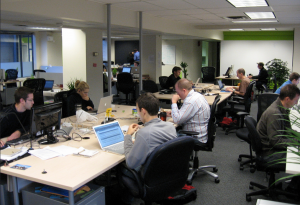Bridging the Technology Gender Gap at DevLearn
There is growing attention being drawn to the challenges women face when working in technology-based fields. The challenges associated with this issue are widespread. From the messages girls receive at an early age that shape their expectations, to the ability to successfully break into a male-dominated field, to the roadblocks encountered when trying to move a technology-based career forward, there are numerous challenges for women working in the technology industry.
At this year’s DevLearn Conference and Expo we are featuring a number of sessions that are exploring this issue. If you are attending DevLearn I encourage you to consider adding one or more of these sessions to your agenda. The more people that are participating in discussions like these, the more we can collectively understand the issues that are holding back our workplaces.
In addition to Neil deGrasse Tyson’s opening keynote – which explores the importance of STEM (Science, Technology, Engineering and Mathematics) fields for workers regardless of gender – there are a number of sessions at DevLearn that are directly exploring this important topic.
We are featuring a keynote session from Belinda Parmar, one of Fortune Magazine’s 55 most powerful women on Twitter, a panel of industry leaders discussing strategies for bridging the gender gap, and a session exploring an observational research study on gender participation.
Here are the details on each of those sessions.
Keynote: Viewing Workplace Technology Through a New Lens
 Belinda Parmar, Founder of Little Miss Geek
Belinda Parmar, Founder of Little Miss Geek
Friday, October 31 @ 11:00 AM
Technology has an image problem. Women are consuming technology but not creating it. Women are leaving the technology sector at twice the rate of men. The number of young women studying technology related subjects has declined every year for the past 10 years. This is increasingly weakening the effectiveness of organizations and workplace learning teams.
In this timely keynote, Belinda Parmar will explore the societal influences that function as blinders to how girls and young women look at technology. She will explore the expectations that are coded into our perceptions as children and how they shape young women’s assumptions of what “working with tech” means, discuss the importance of technology in the context of work, and examine the types of technology skills that are critical in tomorrow’s workplace.
Bridging the Gender Gap
Cammy Bean, Julie Dirksen, Jennifer Hoffman, & Mark Lassoff, with JD Dillon as Moderator
Thursday, October 30 at 11:00 AM (on the Management xChange stage)
Women face an ever-growing list of attributes they lack and strategies they should be adopting to bridge the gender gap in workplaces, especially in the tech industry. The world of eLearning is often no different. But how did fixing that gap become the responsibility of women? In this panel discussion you will explore not what women should be doing differently, but how the workplace itself needs to change to better accommodate the strengths of all workers, regardless of gender.
Alice in Techland
Myra Travin
Thursday, October 30 at 10:30 AM
A conversation begins, most often, with a question. IT blogger Selena Deckelmann suggests that when those in control “ask women directly to speak up, we open the door for participation,” and diversity and inclusion can begin. “If we insist on equal participation, the structure of our organizations will change. The first time I spoke up in a user group was terrifying, but I did so because a peer politely, but repeatedly, asked me to speak.”
In this session you will learn from an observational research study of gender participation in the fields that comprise technology. You will explore the various opportunities that exist for inclusion. You will discuss the barriers that are the most difficult to break through for women who have all the skills and talent necessary to be successful. You will discover strategies to encourage conversations that lead to more participation and greater inclusion.


Leave a Reply